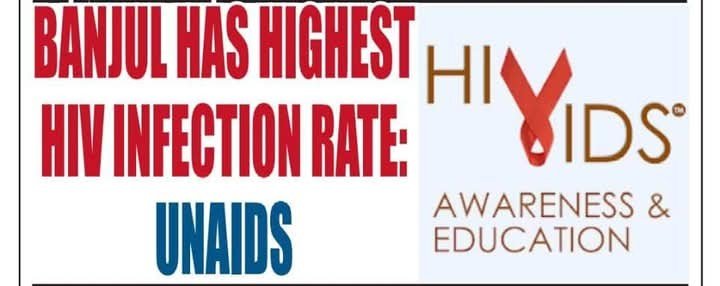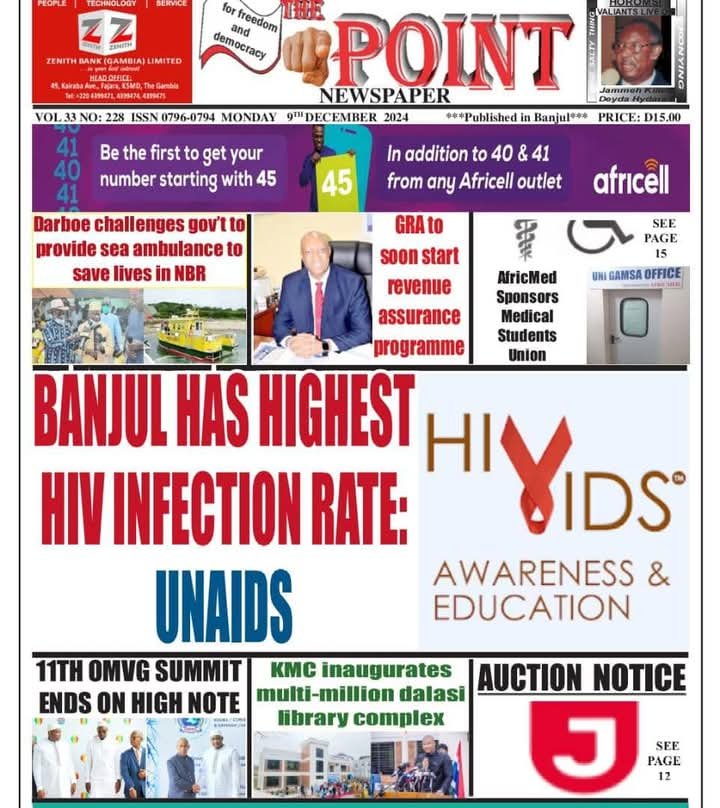FactCheck: Does Banjul Have the Highest HIV Infection Rate?
The Point Newspaper Headline © The Point Newspaper
By Sulayman Njie
Claim:
An article published by the Point Newspaper on 9th December 2024 headlined “Banjul Has Highest HIV Infection Rate: UNAIDS” asserts that the country’s capital city has the highest HIV infection rate. The article suggests that approximately 840 HIV-positive individuals reside in Banjul, referencing data from UNAIDS, and further noted that most infections occur among young individuals aged 15 to 35 years.
According to the UNAIDS report, "these regional variations highlight the importance of targeted interventions in urban areas and among key populations to reduce HIV transmission rates."
But are all the registered HIV-positive cases in Banjul actually residents of Banjul?
FactCheck:
Although the statement is based on credible data, it contains inaccuracies and misrepresentations, which this article aims to clarify.
Our reporter has been monitoring the number of HIV-positive cases in the city since 2017. A forum organized by the Aids Secretariat at Penchami Hall back in 2017 disclosed that 500 infected individuals were registered in the Banjul region.
However, it’s important to interrogate the reasons why Banjul has such a high number of registered persons with the HIV virus and if all of them actually reside in Banjul.
It’s important to note that the data presented by UNAIDS are based on registration, not residency. Registrations are often recorded at the region's facilities as opposed to the individual's residence.
Main Referral Hospital Contributes to High HIV Registration Figures
Banjul hosts the country’s main referral hospital, Edward Francis Small Teaching Hospital, where many HIV statuses are discovered through routine checks, such as blood transfusions.
Patients from various regions are often referred to the Edward Francis Small Teaching Hospital due to acute conditions, necessitating donor testing. Additionally, many individuals prefer undergoing testing in areas where they remain anonymous. The city's workforce, including civil servants, often conducts medical checkups locally due to proximity.
Most of the civil servants and workforce return home to the Kombos and other regions after work, where they actually reside.
Data requires thorough analysis beyond face value, offering a comprehensive view that acknowledges the nuances behind the figures. These insights are provided with the aim of fostering understanding and responsible reporting, leveraging the author’s continuous research, and tracking AIDS surveys since 2017.
Front Page Headline of Point Newspaper 9th December 2024 © The Point Newspaper
Verdict:
The claim by the Point Newspaper that 840 HIV-registered individuals live in Banjul is MISLEADING. This statement, while partly based on true data, contains inaccuracies and misrepresentations that correlate registrations and residency, which is misleading in this context.
While media angles may vary, the overarching goal should be to inform and enlighten the public without inciting undue concern. It's vital for journalists to adopt a careful approach when presenting data, as the difference between registration and residency has significant implications for this story. A more appropriate headline might read, "Banjul has highest HIV-registered cases," which acknowledges the clinic-based nature of these numbers.
The Media’s Role in HIV Reduction
Media houses can play a crucial role in the reduction of HIV cases in the country by raising awareness about the risks of HIV and promoting safe sex practices. However, misrepresenting facts by conflating the number of registered persons with HIV and the number of people resident in a particular region with HIV is very misleading and can create unnecessary fear and stigma.
The Responsibility of Banjul's Authorities
Banjul’s regional authorities also have a very important role to play by proactively disseminating sensitizing information and mitigating risks through education and targeted interventions. In addition, Banjul City Council should look to actively address such misconceptions to protect the city's reputation and get to the bottom of the issue by bringing out the facts on the number of Banjul residents with HIV.


